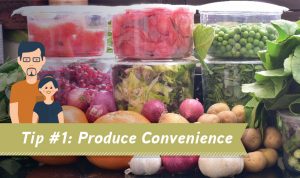“Parents Don’t Want Your Produce“ | Originally featured in Produce Business
By Mark Crouser, Associate Public Relations Director, Signal Theory
Overwhelmed by on-the-go schedules, it is increasingly difficult for parents to commit to healthier eating. Motivated to set a good example for their kids, the majority of parents want to make healthier choices, but feel they must choose between family and health. Unfortunately, this time tug-of-war results in them feeling guilty, no matter what they choose.

Busy schedules are not the only obstacle to parents successfully reaching their family and wellness goals. Our Signal Theory FoodThink research uncovers two other significant barriers, noting, “moms and dads are also more likely to identify a lack of cooking know-how and the taste of healthy foods as additional barriers to healthy eating.”
These factors, including a lack of time, know-how and good tasting options, illustrate a simple fact – parents don’t want your produce.
So how does the industry effectively demonstrate that fruits and vegetables can help overcome these barriers, while providing parents with solutions their families will enjoy?
 Our research shows that parents crave convenience. While the most convenient option for many families is eating out at a restaurant, 75 percent of parents say they also like products that make it easier to prepare meals at home. That’s why when they do find the time to cook at home, they’re reaching for ready-to-eat or preassembled meals and sides. These time-savers help parents catch a break in the kitchen and get meals on the table quickly.
Our research shows that parents crave convenience. While the most convenient option for many families is eating out at a restaurant, 75 percent of parents say they also like products that make it easier to prepare meals at home. That’s why when they do find the time to cook at home, they’re reaching for ready-to-eat or preassembled meals and sides. These time-savers help parents catch a break in the kitchen and get meals on the table quickly.
Whether cutting, peeling, boiling or steaming, preparing produce is perceived as time- and skill-intensive. Conversely, parents are looking for quick, healthy options they can feel good about serving their families. To increase the belief that produce can be a solution for busy parents, the industry must engage in marketing that creatively captures their hunger for convenience.
Simplify mealtime by stocking grocery end caps with ready kits of meal ingredients that includes prepared produce and a meal recipe. That way, parents can visit their favorite retailer, grab a simple meal solution and then easily prepare it at home. You will create the convenience they’re looking for, ensure their produce will be flavorful and allow them more time with their family.
 Parents are striving to both eat healthier and spend more time with their family.
Parents are striving to both eat healthier and spend more time with their family.
Appeal to them and their kids by partnering with retail nutritionists to host in-store tastings and express cooking classes featuring produce. Focusing on cooking as a fun activity will engage families with new ingredients, while building food preparation skills with parents and kids.

Further, it encourages families – no matter who does the cooking – to incorporate fresh, frozen and canned fruits and vegetables into tasty dishes they will love.
These sessions should also be recorded and shared through retail social channels to be viewed at a time convenient for families who can’t attend in person. By showcasing its positive reception and ease of preparation, produce is viewed as a go-to resource for taste, convenience and health.
Recipe ideas can then be merchandised with the product and online, highlighting the ease of preparing a home-cooked meal. By emphasizing produce as inspiration for cooking together, the industry can effectively address parents’ want for health and more time with their families.

Everybody knows fruits and vegetables have health benefits. Unfortunately, foods identified as “healthy” may actually be perceived as unappealing by parents and their kids. Do they also know produce can be indulgent? By focusing on the flavorful attributes, parents don’t have to sacrifice the tastes they desire in order to provide healthy foods for their families.
When shoppers are looking for crowd-pleasing game day snacks or kid-friendly after school treats, entice them with ideas for decadent sweet potato chips or homemade fruit salsa and cinnamon crisps. By addressing their need for indulgence, parents are provided satisfying and flavorful choices that can ease their struggle.
Parents perceive a lack of time, know-how and taste as barriers to eating healthier. In response, the industry should focus marketing efforts on providing the convenience parents crave, the family activity they want and the indulgence they don’t know produce offers. In doing so, the industry can effectively remove the perceived barriers, while improving the adoption of fruits and vegetables as a preferred solution for parents.



